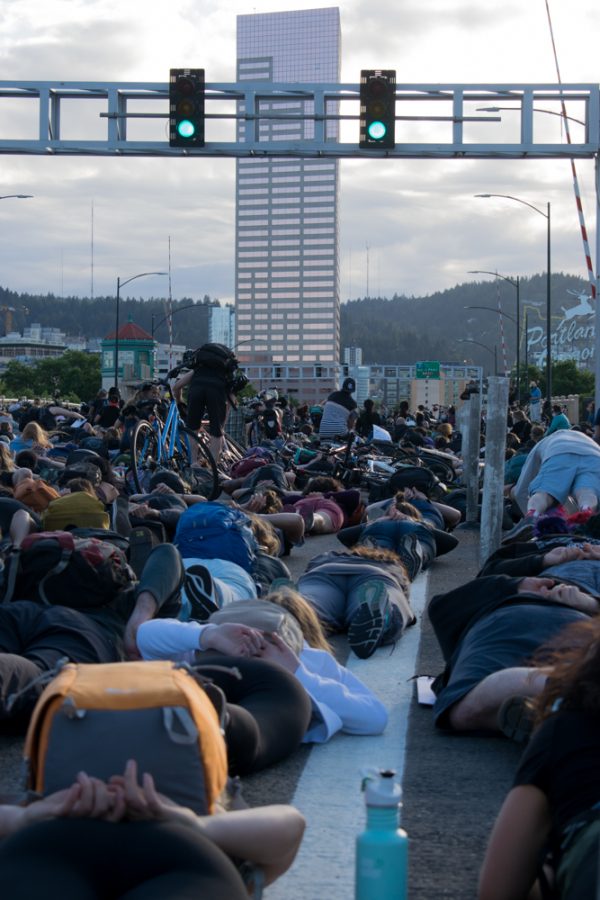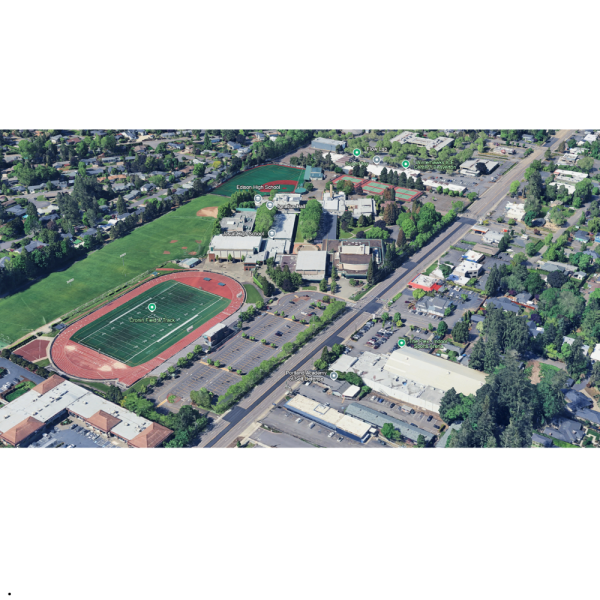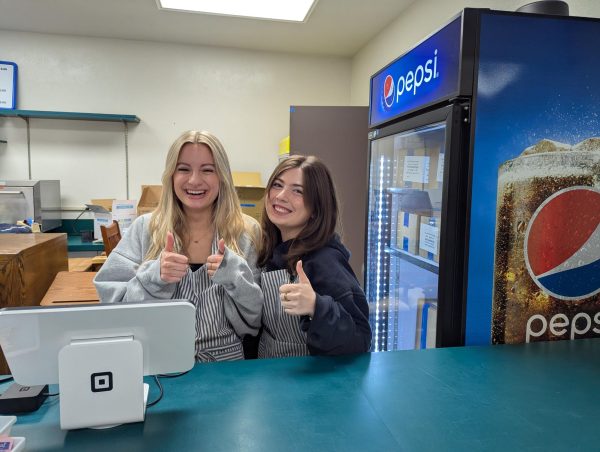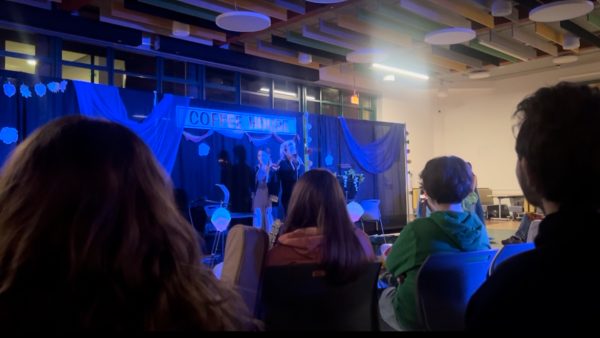High School Political Involvement
Protesters staging a die-in on Portland, Oregon’s Burnside Bridge on June 2, 2020. https://creativecommons.org/licenses/by-sa/4.0/deed.en No changes were made to the following photo.
Starting in May 2020, demonstrations over the police killing of George Floyd have been held in the city of Portland, Oregon. Continuing until September, hundreds and even thousands of Oregon residents gathered to protest against the systemic racism and police brutality black Americans have endured in this country.
These protests were the start of a difficult conversation Jesuit needed to have about systemic racism. Motivated by the injustices in our country, several Jesuit seniors last year took their stories of discrimination to social media to address the imminent problems occurring at Jesuit High School. These students indicated that the school has a lot of work to do to obtain equality and that discrimination is still an issue students of color face.
“ The students that took to social media this summer really ignited the flame for our institution to look in the mirror and acknowledge our own complicity in systemic racism,” said Diversity and Inclusion director Melissa Lowery.
The first step for change to happen anywhere is acknowledging the harm that was caused. After receiving student outcry from petitions wanting the Jesuit Administration to openly support Black Lives Matter and receiving numerous personal messages, Jesuit High School sent out a school wide email ensuring students that Jesuit is proud of them for finding their voices. Brady McClellan even suggested whether he and other students of color earned a chance to attend Jesuit for the right reasons.
“ Students of color feel that they deserve to be at Jesuit but are only there because they promote the identity that Jesuit isn’t racist and that the statistics they fill are more important than the skills and intellect they offer,” junior Brady McClellan said.
Another reason that some students feel excluded is because of the lack of support shown for minority cultures.
“ Jesuit must recognize and support other cultures and their traditions more openly,” said junior Rishabh Sharma.
Students have written letters and spoken directly to the administration because they enjoy Jesuit, and they want other students to have a different experience than themselves.
“ The students this summer who were brave enough to share their own experiences is exactly what we preach and talk about. So for us to have our students come back to us and for many of them to say this with love is the first step for improving our school,” said Mrs. Lowery.
Many Jesuit students have led the charge to change by attending the Black Lives Matter protests. It’s crucial for students to be involved and engaged during these historical times because high school students should be aware of the racism people of color endure. Racism was built into this country through schooling and the criminal justice system, so it’s important to recognize how these systems are being challenged right now.
Another aspect as to why many students have absorbed and have had time to understand these complex issues are due to Covid-19. Being in quarantine has given students opportunities to understand the extent of racism and how it affects the entire community. Quarantine was also an opportunity for many students and supporters to realize their call to action and that the time to stand against racism is now.
“ Being proactive and advocating and protesting for justice is a very Jesuit thing to do, and this is what makes men and women for and with others, it’s our students taking action,” said Ms. Lowery.
As a school community working to become more culturally aware and anti-racist, Jesuit is making attempts to be open to growth. Shifting a culture is a tough task, but this initiative won’t succeed if it is simply a diversity office issue; it is pivotal that all students come together to make a difference.
“ The Jesuit Administration has been working for months in close collaboration with the DEI office to ensure that everyone feels heard, valued, and respected,” said Mrs. Lowery.
Paul Hogan sent out an email clarifying his stance that there is discrimination in our school, and that we need to make it our mission to end it.
President Hogan wrote in the email, “We can and will do better. We can expand our curriculum to include more voices, and we can and must educate all of our students, starting with incoming freshmen, about the ways in which your words and actions can either build up or tear down your brothers and sisters”.
The school also holds the school’s annual Multicultural Week, in which students of all minorities get a chance to present their religious and ethnic customs. Although many students enjoy and cherish the opportunity to display a part of themselves, Rishabh Sharma hopes Jesuit will do more instead of having students lead the week.
“I feel that the administration should try to increase their cultural knowledge and partake in events of other cultures,” Sharma said.
Additional students’ opinions suggest that there are more beneficial ways for students to learn about opposing cultures.
“It would be beneficial to find people of color in certain industries or in the media who would want to speak to their personal experiences,” McClellan said.
Finding people of color in different job industries would certainly be an impactful way to demonstrate different cultures and provide representation for minority groups. In addition, listening is a very effective way to learn about what other minority groups do and what other challenges they have overcome.
Throughout the entirety of the Black Lives Matter movement and the fight for justice, Jesuit has been very committed in listening to others. The Jesuit Administration has listened to the heart wrenching stories of students and is proud of their own for advocating for themselves. The only way to solve these problems is to realize this situation involves the entire community, and that everyone’s voice matters. Although students have voiced their opinions about how Jesuit needs to change to benefit students of all backgrounds, there is no denying that students and faculty are working towards making Jesuit High School a safe and welcoming place for everyone.









